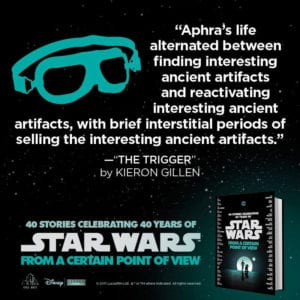A review/discussion of Star Wars: From a Certain Point of View with Angelina and Gretchen.
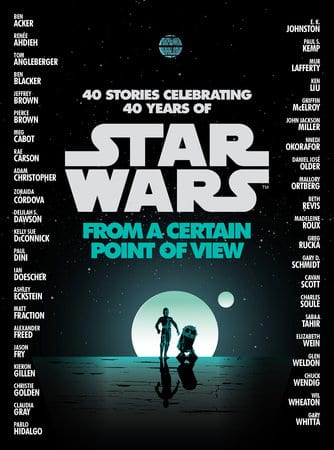 Earlier this year, Star Wars: A New Hope celebrated it’s 4oth, that’s right 40th, anniversary since it’s release on May 25, 1977. In honor of that milestone, Disney and Lucasfilm released a collection of short stories celebrating forty years of Star Wars magic in the form of the book Star Wars: From a Certain Point of View.
Earlier this year, Star Wars: A New Hope celebrated it’s 4oth, that’s right 40th, anniversary since it’s release on May 25, 1977. In honor of that milestone, Disney and Lucasfilm released a collection of short stories celebrating forty years of Star Wars magic in the form of the book Star Wars: From a Certain Point of View.
As the name suggests, it’s filled with all sorts of perspectives; each one reimagines a scene from the iconic first installment of the Star Wars franchise from the point of view of a supporting character. Everyone from Aunt Beru, Doctor Aphra (!!), and Captain Antilles to Boba Fett, Grand Moff Tarkin, and Garindan (the long nosed bounty hunter who sends the Stormtroopers after Han, Luke, and Obi-Wan in Mos Eisley) gets a voice. Even the trash compactor monster gets their say!
Having just watched A New Hope for the Star Wars rewatch project, Gretchen was pretty excited to dive in and see the film in a totally new way. Angelina was no less thrilled, and the two decided to team up. Because what could be more fitting than multiple points of view on a book specifically about alternate perspectives?
The Force is Strong with This One: Our Top Five Stories
Let’s start with what we loved.
Angelina: I don’t have any particular ranking in my mind, because all the stories I like the most are on par with each other, as for me. So the stories are sorted according to the contents list, not according to their worth in my eyes.
- The Sith of Datawork, by Ken Liu. It is both humorous and contains loads of data porn ( I confess I’m a sort of fan of datawork). It also presents us with daily life of the Imperial officers without the romantic haze of battles and sinister intrigue. Trust me, it can be even more frightening.
- The Stories in the Sand, by Griffin McElroy. I can’t really capture the lure of that story, but it is both deeply beautiful, heart-rending, and filled with a sad humor, like a faint smile. A story of a small Jawa enamored with Space, with stories of the other people, with dreams. And despite this short story collection’s penchant for downer endings, I really want to believe Jot will make it off Tatooine. After all, we had Jawas who travelled the big, wide galaxy in the Legends EU!
- Master and Apperentice, by Claudia Gray. Like, it was obvious it would be one of my favorites; Gray has yet to fail my expectations. Besides the beauty of the friendship between Qui-Gon and Obi-Wan and some gems of thought (“Anakin had the training and the wisdom to choose a better path. He did not.” summarizes his story pretty well), it offers us a consistent view of the Force and what the Afterlife is like in Star Wars.
- Beru Whitesun Lars, by Meg Cabot. I mean, yes, it is somewhat unusual choice. This story is not that level of great as the others on my list. And the character, too. And it is meta. But here’s the catch: it is the meta nature of that story that makes it so dear to me. It lets a character speak that has been muted, ever made into a decoration. Much like Breha, Beru was always sidelined. Unlike Breha, she can’t be reimagined into an action political heroine. That doesn’t make her any less interesting — or any less heroic. The whole thing reads less like a “Beru was actually that person, now you know it” to me, and more a fellow fan saying: she could be someone like this, or someone other than this, but anyway we won’t know it, because she isn’t given a face. I think it was personal, really, rather than an attempt at ‘canon.’
- Contingency Plan, by Alexander Freed. Well, it was another sure shot — I liked his novelisation of Rogue One, and Mon Mothma’s POVs in that novelisation were really and truly great. So, of course, this POV of hers was great, too. Mostly because she was at long last let to be human. Let to be not perfect. Let to despair, to make gross mistakes. And still, if any story is anti-grimdark, it is this very story about depth of despair and where they can lead a good person.
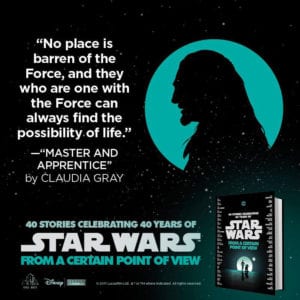
Gretchen: I don’t have any ranking in mind either, mostly because they’re all different from each other. How do you rank a humorous inside look at imperial bureaucracy against a moving tale of a Jedi master and apprentice reconnecting across the years? As with Angelina, my list is based on book order. My first two picks were actually already on her list, so I decided to leave one of them off (The Sith of Datawork, which is hilarious, you should read it) to make room for a different one.
- Master and Apperentice, by Claudia Gray. Given that I’ve raved about her two Princess Leia novels, it should come as no surprise that I devoured this story. Gray brings a depth of understanding to the characters in this universe that is unmatched. It’s evocative, emotional, and breathtakingly sad and poignant. Fans have long speculated that Obi-Wan would commune with Qui-Gon, and we at last get to see what that looks like. Can someone commission her to write an Obi-Wan novel set on Tatooine in between Revenge of the Sith and A New Hope? Please and thank you.
- An Incident Report, by Mallory Ortberg. Ortberg is a genius, hands down. I’ve long admired her wit, but she took it to a whole other level with this tongue-in-cheek look at the infamous “I find your lack of faith disturbing” Force-choking incident. I could not stop laughing. It’s perfection. As with Liu’s dataork story, it offered an entirely new perspective on the story. Vader’s statements about the Force become workplace proselytizing; Motti’s defense of the Death Star an assertion of loyalty and commitment to the Empire’s militaristic might on the day that their greatest weapon was unveiled. Vader might find his lack of faith in the Force disturbing, but Motti finds Vader’s lack of faith in the Empire and it’s military even more disturbing.
- The Trigger, by Kieron Gillen. Come on, it’s Doctor Aphra. No way I wasn’t going to adore a Doctor Aphra short story. I’ve only interacted with her character via comic, and I must say, getting to see her in prose lived up to my expectations. She’s just as irreverent, just as cynical, just as snarky and pragmatic and amoral (with an undertone of moral) as the comics. She knows a surprisingly (well, not surprisingly for her) high amount of ways to destroy a planet. And how to talk a stormtrooper into existential terror over the idea of killing her all while making an insightful commentary on killing and war. God, I love her. Thank you Kieron Gillen for this gift of a character.
- The Baptist, by Nnedi Okorafor. Okorafor’s dreamy, vivid prose is to it’s best advantage in this story of the trash compactor monster, who also happens to be force sensitive. The tale haunted me and drew me in all at once, as her work often does. It’s poetic, and she’s able to capture the ephemeral—like what the Force feels like to someone who doesn’t know what the Force is—in an understandable way without being overly explanatory.
- By Whatever Sun, by E. K. Johnston and Ashley Eckstein. Seeing the medal ceremony from the eyes of a beloved secondary character from the Ahsoka ΥΑ novel warmed my heart. The mixture of grief, pride, and hope struck precisely the right tone for this scene. I can’t deny that getting a peak into Kaeden’s and Miara’s futures wasn’t a treat in itself, either. Johnston and Eckstein included a nice Fulcrum headnod as well (Ahsoka lives, goddamit). Most of all, the concluding paragraph felt like the perfect way to end both the story itself and the narrative of A New Hope. Once again, the mingling of sorrow and resistance strikes an appropriate balance for the story. It’s also a powerful message for today’s political and social climate. I think Carrie Fisher would approve.
“With grief on her cheeks and hope in her heart, Miara Larte added her voice to those in the cavern who celebrated the living and remembered the dead. It would be a long night, she knew. She had lived long nights before. But in the morning, by whatever sun, she would get up and she would rebel.”
I’ve Got a Bad Feeling About This: Our Bottom Two Stories
In a book of 40 stories, even 40 Star Wars stories, there’s bound to be some misses, unfortunately. That isn’t to say these are terrible stories, just the ones we liked the least.
Gretchen:
- Beru Whitesun Lars, by Meg Cabot. I admit, much of my dislike is personal. As a woman who cannot have children myself, I’m highly attuned to how infertility and ensuing motherhood is discussed in media. As much as I wanted to like it since Beru has been silenced in much of Star Wars canon, I couldn’t. It was both too cliché (fancy fertility droids!) and too cursory (infertility was hard, but then I got a baby and everything was better!). I found Beru’s desire to be a cafe owner unconvincing, and the framing of her Ultimate Satisfaction as a Mother™ left me cold. Again, I really, really wanted to like this story; I was thrilled when I heard Beru was going to get a perspective, and I do appreciate the meta aspect of it. But again, it felt like every hackneyed trope associated with infertility and motherhood was thrown together in three pages. In my opinion, it wasn’t deep enough or sensitive enough to do Beru justice after decades of neglect.
- Added Muscle, by Paul Dini. I don’t care about Boba Fett. There, I’ve said it. What bothers me about this story is how much it plays into the conception of Boba Fett as this ‘badass’, too-cool-for-school bounty hunter who is somehow better than Han Solo because he has cool armor and kills things for a living. He doesn’t even have a personality in the original Star Wars trilogy, and all we see of him in the prequels is him being a moody child who fights with his dad. He’s little more than Mandalorian armor and a blaster. I also found him calling Han the “biggest loser in the galaxy” off-putting. But, most damning of all, Dini failed to capture any of the rhythms of Jengo Fett’s speech when writing Boba. For first person narration, annoying head space and internal thoughts is an instant dislike from me. “Sizzled hicks”? “Twerp your guts”? Really? Maybe I’ve been watching too much The Clone Wars recently, but I could not put Boba’s speech patterns into the accent used for the clones. It should fit because Boba is also a Jengo clone; the fact that it didn’t made an already mediocre story to my mind nearly unreadable.
Angelina:
- Eclipse, by Madeleine Roux. I can absolutely say that Breha Organa was excellent in Leia, the Princess of Alderaan. That’s why I felt so much pain reading her story in Eclipse. Not only did the author have little perspective on what royal life is like (I mean, really, droids continuing to approach the Queen while she is busy? Even on very democratic Alderaan,no way), she had managed to write Breha as though there was no previous story there. Like, at all. Breha is still that vague figure in shadow who is just a wife and a concerned mother. If there is OOC, it is here, where Breha (a person who, as far as we know, was the more radical Organa about the Rebellion) acts as though she is as unwilling to enter it as a major player. Also, I found the whole conflict of the story slightly ridiculous; it seemed to me the author didn’t take Rogue One into consideration. I mean, a person carrying stolen Death Star plans vanishes from sight altogether? Ah, let’s start a search, it must have been an accident!
- Time of Death, by Cavan Scott. I spent some time sorting those stories I liked less, but this was the only one I couldn’t make myself read up to the end. Maybe it’s my own fault, but I found it both too boring and too pretentious. It is written in unbearably terse, chopped phrases that sadly remind me of the first Aftermath. Maybe I wouldn’t choose it if there was no Claudia Gray’s Ben to compare it to. Comparison kills, I suppose. Nevertheless, when someone is better fleshed out as a secondary character with little dialogue than as a POV character, it’s telling.
Hear Me, Baby, Hold Together: Overall Thoughts
It’s not as dire as that heading would make you think, we were just being overly clever with section titles. In fact, both of us liked the collection overall, despite some missteps.
Angelina: It was very, very uneven, as for me. It reached great heights of tragedy sometimes, or lesser heights of humor/satire, but then it fell into something I can’t name other than “my first Star Wars fanfic.” Not that all those less brilliant works were dire, or something; they were actually pretty good…as fanfic standards go. Standing side by side with prose gems like The Baptist, though, they are damned by comparison, and their worst side shows more than the good elements included.
Gretchen: I completely agree. The humor/satire pieces were some of my favorites (as you can see from my list), but I equally enjoyed some of the more pathos and tragedy driven tales. But you’re right, there were also several stories that stood out as very “my first Star Wars fanfic”-like, at least one of them by an established author in the Star Wars universe! (That one was especially disappointing to me and made me less excited to read her book, which I had literally just picked up from the library the same day this book came out.) A writer actually used the term ‘orbs’ to describe Leia’s eyes, you guys. Like…no. Just no.
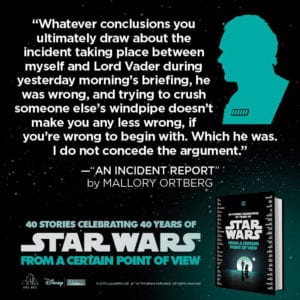
Angelina: I was also upset that, while writing about a new hope, so many authors aimed for a cheap tragedy with “and then all those guys you started to care about died horribly.” I mean, it is a cheap device. And used too many times one right after another, it becomes less painful and much more annoying.
Gretchen: In the aftermath of Rogue One, “I’m dying, but I’m still hopeful” has less overall impact, I think. Since Rogue One was also a bit messily done, echoing that same vibe doesn’t evoke the kind of catharsis that I think the writers of these stories want it to have. And you’re absolutely right, placing so many stories with similar endings in the same collection does undermine the emphasis on hope. Characters dying hopefully is nice, but it’s still a lot of characters dying in a story collection meant to be about, well, A New HOPE.
Angelina: Still, even being placed besides something unworthy doesn’t make gold into brass, so at least more poorly written stories don’t make the good ones worse. I loved what I loved in this collection much more than I disliked or was annoyed by what I disliked, if that make sense.
Gretchen: Totally makes sense, and I agree. I’d seen some early criticism that focused on one story or other that didn’t land rather than the collection as a whole, and to me, that’s not the best way to view it. There are some poorly written, out of character stories in From a Certain Point of View, but they don’t tarnish the truly beautiful, well-written ones.
Angelina: Right. If I’m talking about the book as a whole, I loved it. It was, more or less, like those 40 years of Star Wars in a nutshell: a collection of very uneven, sometimes random, sometimes tropey and amateurish, sometimes brilliant and deep, sometimes forced and soulless, and sometimes truly heart-rending and filled with true love stories telling us about how life had been “long, long ago in a Galaxy far away” (yep, a pun here).
Gretchen: Perfectly put. I also want to say that I appreciate the diversity of point of view characters chosen for the collection. We’re so used to experiencing Star Wars from the human perspective, so the inclusion of so many non-human and even non-organic characters delighted me. Jot the Jawa, Reirin and A’Koba the Tusken Raiders, Long Snoot, and even Greedo the Rodian offered unique perspectives on this galaxy. Though in varying levels of engagement to me personally, their inclusion in the story is refreshing.
Angelina: Oh yes! If there was any feature of the old Legends EU I missed the most in the new canon, it was its diversity and the amount of consideration it payed even to the most minor characters that were on screen for split seconds of time. Not that it was always masterful, but was it there: a wide variety of life forms and their lives. Now we have an alternative, which is always good (and oh my, The Baptist is so great!..) And I can only cheer for the return of a POV short stories anthology as a form of Star Wars media. Because really this one is on par with the older series, both in quality and in contents.
Great Shot, Kid!: Easter Eggs, Worldbuilding Gems, and Other Random Delights
Gretchen: My favorite worldbuilding element was getting to see more of the interior lives of non-human characters. Seeing how droids and trash compactor monsters live and experience this world opens up whole new avenues of exploration. What does the Force feel like to those unfamiliar with what it even is? What does it feel like to be an aging, failing droid? It didn’t make my top five, but The Red One was a close #6 on my list for how much pathos it brought to the story of R5-D4, the droid with the ‘bad motivator’ that led to Owen choosing R2-D2. Droids having emotions at this level is at once a neat easter egg and also kind of terrifying in it’s implications for the universe at large.
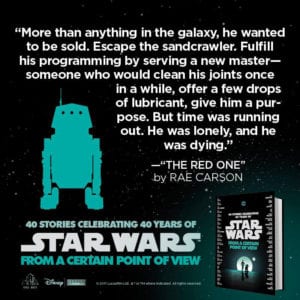
As much as I found it a bit lacking in excitement given the subject matter, Gary Whitta’s “Raymus” tied together the end of Rogue One and the beginning of A New Hope well. The explanation of the ship being damaged and easily trackable made sense of how Vader found Leia so quickly. Similarly, Pablo Hidalgo’s Verge of Greatness gap filled some of Tarkin and Krennic’s backstory for both A New Hope and Rogue One, in a compelling, visceral way. He made them foils of each other in compelling way that stayed true to their characterizations. Bravo.
I feel like Jeffrey Brown’s cartoon deserves special mention, as it manages to tell a funny story of Rebels outwitting the Empire in a single Gary Larson-esque panel.
Oh, and I’d most definitely read a Star Wars ya novel about a force sensitive female Tusken Raider named Reirin. Just saying.
Angelina: Well, I liked the Whills story. I mean, I still have some reservations about ethics of directly addressing the fandom that way, but I liked it. It was about us, the ever-nitpicky, ever-whiny fandom that can never be satisfied whatever we are given. It reminds me the importance of saying “Thank you!” to my favorite universe before going on a long rant about what is not okay with it.
As for worldbuilding, my pick would be Nnedi Ocorafor’s The Baptist, which explores in great length what it is to be a Force user while not knowing what the Force even is. Also, an interesting, while a bit hasty, insight into the life of the dianogi. I really want to know how (and why exactly) they choose gender, after all that. On a lesser scale, Jot is my Jawa love, and Claudia Gray gave us the vision of the Force as an Afterlife, which is both great and long waited for.
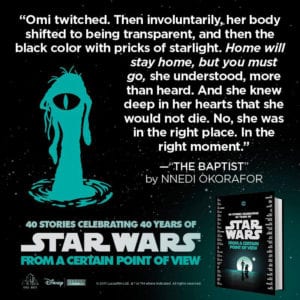
A small personal delight for me was the name of the officer who gave the order not to fire on the escape pod (that “No life forms” guy). It’s “Bolvan”, and now I really want to know if the author choose it consciously or by chance. Because in Russian “bolvan” means “dumbass”, a word which, well, perfectly describes the person in question.
Also Mon Mothma/Cianne interaction pulls some femslash strings deep inside my soul.
Final Score
7 – Satisfying. Fantastic! Entertaining! I would be willing to watch read it again. It isn’t perfect, but it hits an emotional or thematic sweet spot that leaves you glad you spent time on it.


